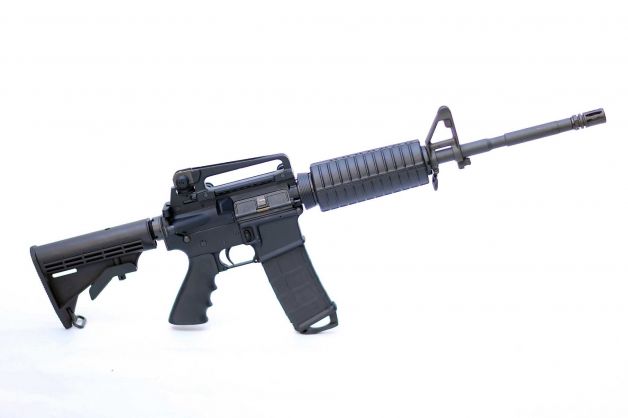Hillary Clinton Seeks To Roll Back Protections For Gun Corporations
October 5, 2015
Former Secretary of State and 2016 presidential candidate Hillary Clinton has proposed a new American gun protection bill that would, among other things, impose additional liability on gun manufacturers for personal injuries and wrongful deaths caused by firearms and assault rifles.
2005: Gun Companies Persuade Republicans To Shield Them From Liability To Injured Persons
For many years until 2005, gun corporations and the National Rifle Association unsuccessfully lobbied Congress to pass laws that would protect manufacturers and distributors from liability to injured persons.
On October 20, 2005, however, their efforts were successful, when the Republican-controlled Congress, several Democrats, and President George W. Bush enacted legislation to protect manufacturers from personal injury lawsuits.
The law, called the “Protection of Lawful Commerce In Arms Act,” provides that injured persons and their families cannot bring “qualified civil liability actions,” which are defined as:
“ a civil action or proceeding or an administrative proceeding brought by any person against a manufacturer or seller of a qualified product, or a trade association, for damages, punitive damages, injunctive or declaratory relief, abatement, restitution, fines, or penalties, or other relief, resulting from the criminal or unlawful misuse of a qualified product by the person or a third party.”
2015: Hillary Clinton Seeks To Roll Back Liability Shield
In October 2015, Hillary Clinton unveiled a proposal that would close the “gun show loophole” and also repeal the PLCAA’s personal injury protection for gun manufacturers.
PLCAA Does Not Prohibit All Personal Injury Suits
While critics claim the PLCAA provides too many protections for gun manufacturers, it does not bar all personal injury or wrongful death actions.
In fact, the bill expressly permits lawsuits for design and manufacturing defects.
It also permits personal injury and wrongful death lawsuits for “negligent entrustment,” which the Act defines as “the supplying of a qualified product by a seller for use by another person when the seller knows, or reasonably should know, the person to whom the product is supplied is likely to, and does, use the product in a manner involving unreasonable risk of physical injury to the person or others.”
The text of the Act expressly allows the following lawsuits:
“(i) an action brought against a transferor convicted under section 924(h) of title 18, or a comparable or identical State felony law, by a party directly harmed by the conduct of which the transferee is so convicted;
(ii) an action brought against a seller for negligent entrustment or negligence per se;
(iii) an action in which a manufacturer or seller of a qualified product knowingly violated a State or Federal statute applicable to the sale or marketing of the product, and the violation was a proximate cause of the harm for which relief is sought, including—
(I) any case in which the manufacturer or seller knowingly made any false entry in, or failed to make an appropriate entry in, any record required to be kept under Federal or State law with respect to the qualified product, or aided, abetted, or conspired with any person in making any false or fictitious oral or written statement with respect to any fact material to the lawfulness of the sale or other disposition of a qualified product; or
(II) any case in which the manufacturer or seller aided, abetted, or conspired with any other person to sell or otherwise dispose of a qualified product, knowing, or having reasonable cause to believe, that the actual buyer of the qualified product was prohibited from possessing or receiving a firearm or ammunition under subsection (g) or (n) of section 922 of title 18;
(iv) an action for breach of contract or warranty in connection with the purchase of the product;
(v) an action for death, physical injuries or property damage resulting directly from a defect in design or manufacture of the product, when used as intended or in a reasonably foreseeable manner, except that where the discharge of the product was caused by a volitional act that constituted a criminal offense, then such act shall be considered the sole proximate cause of any resulting death, personal injuries or property damage; or
(vi) an action or proceeding commenced by the Attorney General to enforce the provisions of chapter 44 of title 18 or chapter 53 of title 26.”
In the years leading up to the bill, many injured people and their families, as well as municipalities including New York City, had filed lawsuits against gun manufacturers whose firearms and weapons (including assault rifles) were used in shootings.”
Texas Gun Injury Lawyers Help Victims Nationwide
Regardless of whether the PLCAA is repealed, our Houston-based personal injury lawyers will continue to help victims of gun violence and preventable gun accidents nationwide pursue claims against gun manufacturers to the fullest extent of the law. We handle serious gun injury cases around the country.
If you or a loved one has been injured or killed in a gun accident, it would be our privilege to discuss whether you are entitled to bring a claim under existing law.
We provide free and confidential consultations for everyone, and our clients only get paid when we win.
Contact us now at 1-800-489-2216 (toll-free) or 713-489.1206 (local in Houston), or fill out the online case evaluation form above.
- Home
- |
- Dangerous Drugs & Products
- |
- Hillary Clinton Seeks To Roll...
















































